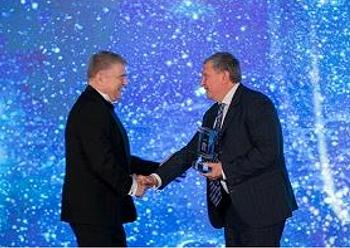
MOSCOW, Russia, July 22, 2016 (ENS) – Russian chemist Dr. Valentin Parmon has won the 2016 Global Energy Prize for his work with new generation catalysts for the production of diesel and other motor fuels, fuel production from plant materials, and for the transformation of solar energy into chemical energy.
Born in Germany, Dr. Parmon is thoroughly Russian now. He is a member of the Russian Academy of Sciences (RAS), and scientific advisor to the Institute of Catalysis under the Siberian branch of RAS.
“Being awarded the Global Energy Prize is a great honor for me. It’s truly remarkable that for the first time the prize is awarded to a chemist,” he said at the Global Energy Prize Award Ceremony June 17 during the St. Petersburg International Economic Forum in St. Petersburg, Russia.
Parmon said he would use the prize’s RUB39 million (around US$600,000) to support young scientists and their research.

“Valentin Parmon created a new direction in science – radiation and thermal catalysis says the Global Energy Non-Profit Partnership on its website.
“It’s very important that the Global Energy Prize acknowledges achievements in the sphere of catalysis – the most in demand segment of chemistry,” said Parmon.
“The scientists who work in catalysis make a huge contribution into the development of petrochemical industry, also in perspective technologies like shale oil and gas refining,” he said.
On behalf of the president of the Russian Federation, the award was handed to the laureate by Igor Sechin, president and chairman of the Board at Rosneft, the majority state-owned and largest publicly-traded oil company in Russia. Sechin also heads the Presidential Commission on Strategic Development of the Energy Sector.
Sechin noted that the research in the sphere of catalysis done under Parmon’s leadership enabled “a real breakthrough” in the petrochemical industry.

“This is extremely important in today’s conditions. There are fewer states in the world that use full potential of catalysis than the ones that have advanced nuclear technologies,” said Sechin.
Dr. Parmon is the author of many breakthrough inventions that have done well in the marketplace.
In 2003-2006 new generation catalysts for production of motor fuels, in particular, diesel, complying with the Euro-4 and Euro-5 standards, were designed and industrially introduced under his supervision.
Within those three years, Dr. Parmon received RUB500 million from the state for research on the project. The introduction of new catalysts yielded additional products, such as high octane super-gasoline.
He also develops methods of fuel production from plant raw materials such as wood and rice.
Parmon has mastered the technology of transforming solar energy into chemical energy.
A number of solar catalytic reactors designed and tested under his supervision reached an efficiency of solar energy conversion to chemical fuel of 43 percent at 2 kW of available capacity – an indicator that has not yet been surpassed.
Global Energy Prize International Award Committee Chairman Rodney John Allam, a British physician, told reporters at the Forum that while the mix in energy sources is shifting to lower carbon fuels, still 90 percent of energy production and consumption are covered by oil and gas.
“The worldwide statistics show that energy consumption from traditional sources is reducing,” said Allam. “In the past year the use of ‘green’ energy has increased by one percent. But, unfortunately, renewables develop not as fast as we would like – oil and gas continue to the main fuel in all countries of the world. Renewables only represent 2.8 percent of global energy production, and during the economic crisis, this won`t change,” Allam said.
“Today it is necessary to develop breakthrough technologies for efficient use and extraction of traditional energy sources,” Allam said. “The shale revolution has unlocked vast new reserves of hydrocarbons which can be exploited worldwide. And this has triggered the emergence of new technologies.”
“We`re used to oil which is easy to extract but there`s not that much of it left,” said Parmon. “There is a fast-growing need for the development of complex oil-fields and the use of associated petroleum gas. These trends require new scientific breakthroughs.”
“In our institute we study and offer solutions for both traditional and renewable energy sources. And, if necessary, we`re ready to develop our technologies to make them ready for industrial use,” Parmon said.
The Global Energy Prize is an independent award for outstanding scientific research and technological developments in the energy field, which contribute to the benefit of humanity.
The nominating pool of the Global Energy Prize is represented by 3,000 scientists from 83 countries. The final choice of the laureates is made by The Global Energy Prize International Award Committee, which consists of 20 scientists from 13 countries.
Since it was founded in 2003, The Global Energy Prize has been awarded to 34 laureates from 10 countries: Canada, Germany, France, Iceland, Japan, Russia, Sweden, Ukraine, the United Kingdom and the United States.
Copyright Environment News Service (ENS) 2016. All rights reserved.
